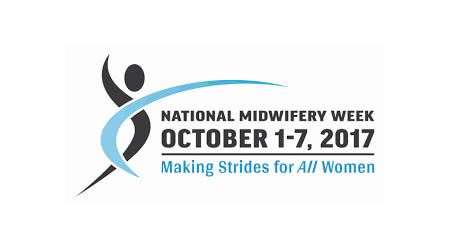The American College of Nurse-Midwives (ACNM) is once again sponsoring National Midwifery Week, which kicks off today, October 1, and lasts through Saturday, October 7.
For centuries, nurse midwives have been partners and guides in women’s healthcare around the world. They carry out their compassionate care wherever it is needed as a woman progresses through her life. Nurse midwives are best known for their care during pregnancy, childbirth, and the post-partum period, but they can assist women throughout each stage of their lives—from the teen years to women past menopause.
Nurse midwives deliver services in homes, hospitals, birth centers, and other healthcare settings. They are there to carry out routine physicals through to newborn care.
Although there are several types of midwives, certified nurse midwives (CNM) have a degree in nursing and a graduate degree in midwifery nursing plus additional training and specific certification (through the American Midwifery Certification Board) in midwifery. CNMs are able to prescribe medication. Certified midwives have degrees in an area other than nursing, but then progress through the same certification process. In the United States, the overwhelming majority of midwives are CNMs.
Midwives have always played an important role in patient-focused healthcare as their care approach is directed on the patient and what she needs at that given point in time. Every woman’s body is as different as her healthcare needs, so midwives are trained in assessing each woman’s individual situation to bring her the best healthcare possible.
Most midwives work as part of a woman’s healthcare team, and spend direct one-on-one time to establish a trusting relationship and to learn what the woman wants from her healthcare. Nurse midwives provide their patients with plenty of education so they can make the best, most informed, and most comfortable decision for themselves.
And a nurse-midwife provides the essential hands-on care during labor and delivery, offering both physical comfort and emotional support. Especially during a low-risk pregnancy and birth, the guidance and presence of a nurse midwife gives a woman a greater sense of control as labor progresses and reduces the occurrence of interventions like a c-section while raising the percentage of new moms who initiate breastfeeding.
According to the ACNM, “In 2014, CNMs/CMs attended 332,107 births—a slight increase compared to 2013.” Those numbers amount to about 8.3 percent of all US births. The expertise provided by nurse midwives coupled with the patient-centered and customized plan of care is becoming an increasingly popular option for women who are seeking more personal care from a highly trained professional.
This week, celebrate the nurse midwives in your life with a acknowledgment of how their steady care helps moms and babies throughout the world. If you are a midwife, this is a good time to share your story and call attention to your profession. Post on social media using #MidwivesMakingStrides and share your patients’ feelings about nurse-midwife care.
- Is the FNP Program Right for You? - April 24, 2024
- WOC Nurses Week Highlights Specialty - April 16, 2024
- Honoring Radiology Nurses Day on April 12 - April 12, 2024



